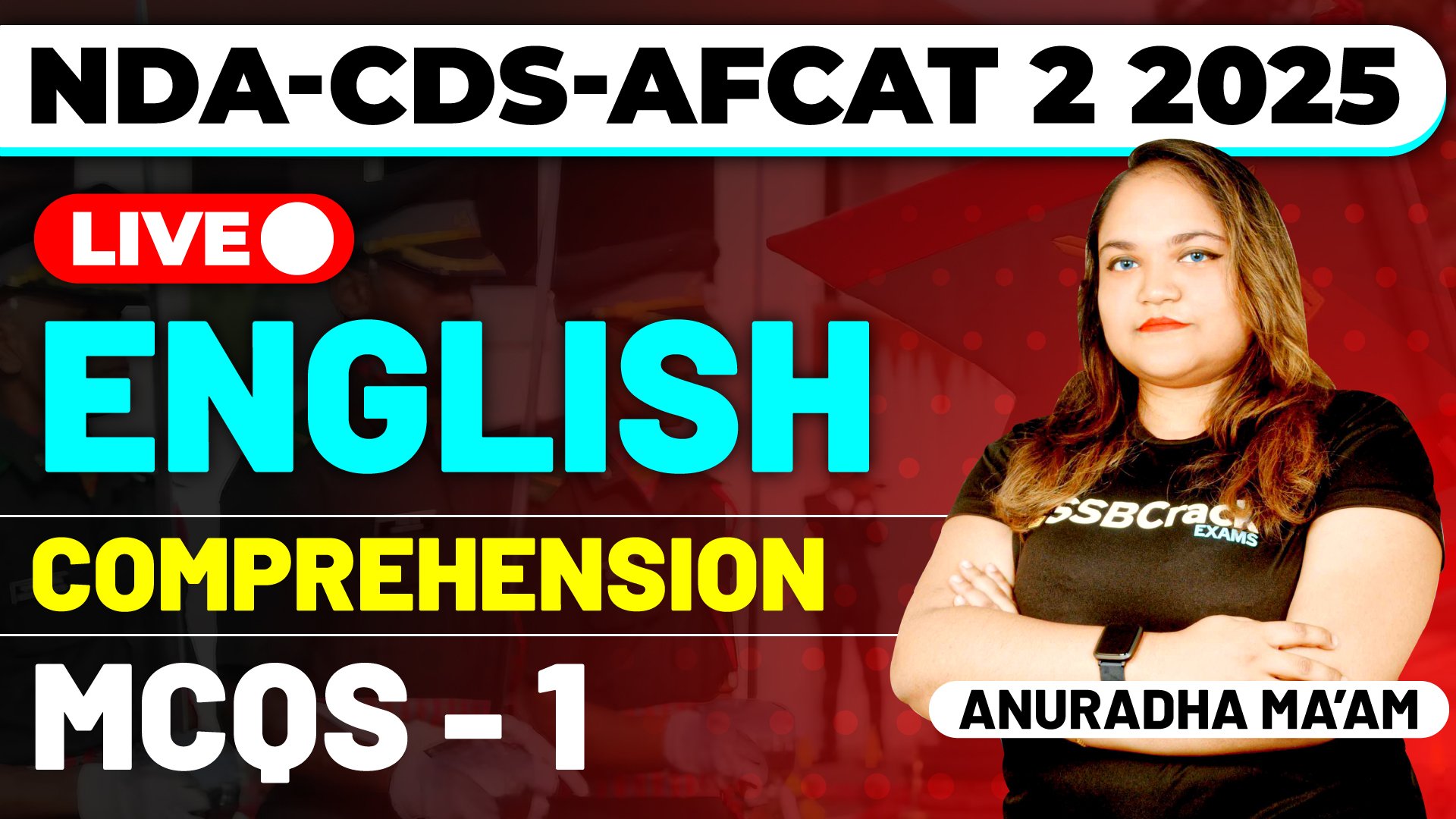In competitive defence entrance exams such as NDA, CDS, and AFCAT, the English section plays a decisive role in enhancing overall merit. Among the variety of topics asked, Reading Comprehension holds a unique position. It is not just a test of vocabulary or grammar — it evaluates a candidate’s analytical reading, logical thinking, and interpretive clarity.
In our Comprehension MCQ Live Class 1, aspirants were exposed to a range of reading-based multiple-choice questions designed to assess how effectively they could extract meaning, detect inferences, identify main ideas, and understand the tone of the passage — all critical for scoring well in the English paper.
Directions: Read the passage carefully and answer the questions given below.
There is more than a modicum of truth in the assertion that “a working knowledge of ancient history is necessary to the intelligent interpretation of current events”. But the sage who uttered these words of wisdom might well have added something on the benefits of studying, particularly, the famous battles of history for the lessons they contain for those of us who lead or aspire to leadership. Such a study will reveal certain qualities and attributes which enabled the winners to win and certain deficiencies which caused the losers to lose. And the student will see that the same patterns recurs consistently, again and again, throughout the centuries.
Q) A person who aspires to lead could learn from the history of battles
(a)what led the previous leaders win a battle
(b)what made them lose a battle
(c)the qualities and deficiencies of commanders of these battles
(d)the strategies that they have evolved in course of these battles
Ans. (c)
Q) In this context, “intelligent interpretation of current event” means
(a)rational explanation of events
(b)appropriate understanding of events
(c)intellectual outlook on events
(d)skillful interpretation of events
Ans. (a)
Q) The expression “more than a modicum of truth” means
(a)some truth
(b)much truth
(c)more than a small amount of truth
(d)nothing but truth
Ans. (c)
Q) According to the writer, a study of famous battles of history would
(a)be beneficial to wise men
(b)provide food to modern leaders for reflection
(c)be more useful than a general knowledge of ancient history
(d)help us understand the art of modern warfare
Ans. (b)
Q) A knowledge of history is necessary to interpret current problems because
(a)they have roots in the past
(b)they can be contrasted with the past events
(c)they may be repetitions of past events
(d)only then they can be put in a proper context
Ans. (c)
For more questions, check out NDA-CDS-AFCAT 2 2025 Exam English Live – Comprehension – MCQ Class 1
What is Reading Comprehension?
Reading comprehension involves reading a passage — typically factual, literary, philosophical, or abstract — and answering MCQs based on its content. The questions may test:
- Main idea (What is the central theme?)
- Factual understanding (What does the passage state?)
- Inference drawing (What can be concluded?)
- Vocabulary in context (What does a word mean in this context?)
- Author’s tone/purpose (What is the writer’s attitude or aim?)
What We Did in Comprehension MCQ Live Class 1
In our first dedicated class on Comprehension, candidates practiced:
- Skimming & Scanning the passage for key information.
- Breaking down questions into what’s being asked: factual, inferential, or vocabulary.
- Using context clues to derive the meaning of unfamiliar words.
- Identifying tone words to determine the passage’s mood — critical for AFCAT & CDS.
Skills Reinforced in Class:
- Reading with Purpose: Learning to read not just for words, but for meaning.
- Locating Keywords: Navigating the passage quickly to pinpoint answers.
- Evaluating Options: Eliminating choices based on tone and intent.
- Understanding Context: Not every word means what it usually does; context is king.
Common Mistakes Candidates Make
| Mistake | Strategy Taught in Class |
|---|---|
| Reading the passage too quickly | Read the first and last lines carefully; scan middle for details. |
| Guessing vocabulary meaning | Use surrounding words to infer meanings. |
| Picking options too early | Read all four options before finalizing. |
| Overanalyzing factual questions | Stick to what is clearly mentioned. |
Final Takeaways from Live Class 1
- Comprehension is not passive reading — it’s active analysis.
- Mastering it leads to high scores in minimum time.
- Regular practice with different passage types (story, factual, argumentative, philosophical) is key.
- Build reading stamina with newspapers, journals, and editorials.
Conclusion
The Comprehension MCQ Live Class 1 was designed to instill confidence and equip NDA, CDS, and AFCAT 2 2025 aspirants with tools to tackle this vital topic effectively. With focused practice and the strategies discussed, candidates can transform this section from a challenge into a high-scoring advantage.







